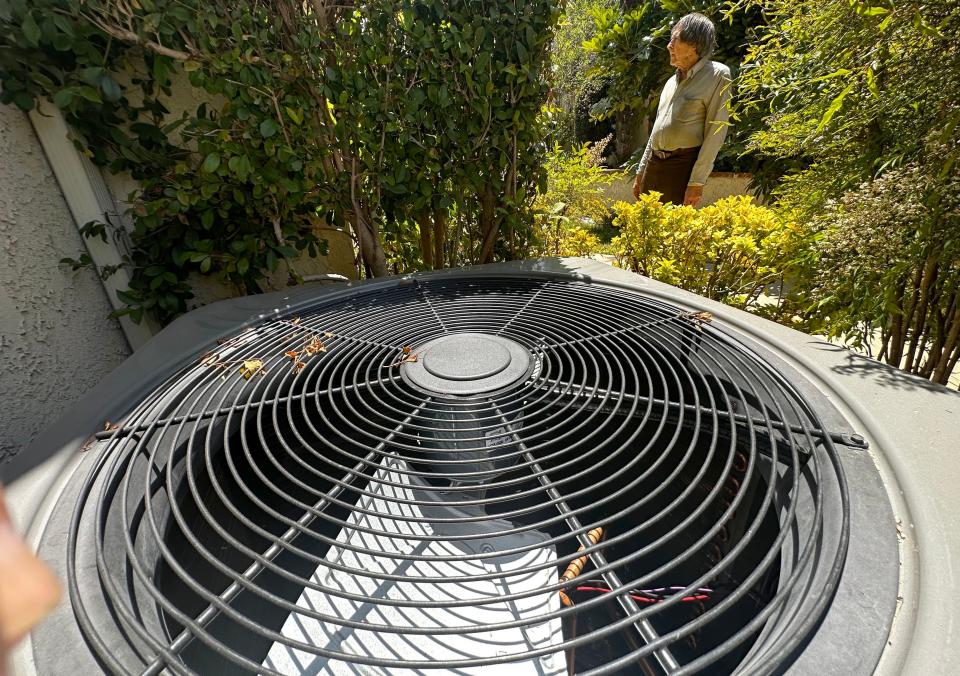Need your A/C repaired during this Florida heat wave? You're not alone
When the daily low temperature stops dipping below 80 degrees Fahrenheit, Ryan Del Vecchio knows it’s going to be a chaotic day.
Air-conditioning units across Florida have been taking a beating from record-breaking heat and multiple days where the “feels-like” temperature hits above 100 degrees. As residents try to keep their cool indoors, their units are working overtime, which can lead to more instances of system failure.
Enter the most popular people of summer: the ones who work at air-conditioning companies.
“Summertime for us is just like when waitresses work doubles in December,” Del Vecchio said. “We know we’re not getting off early.”
Heat wave slamming A/C companies worse than past summers
Calls for service have been coming in nonstop to businesses like Del Vecchio’s All Time Air Conditioning and Anthony Smith’s A.R.S. Air Conditioning, both in Boynton Beach.
This June was the hottest month recorded on Earth. And so far, July in West Palm Beach has seen minimum daily temperatures mostly hovering in the mid- to high 70s and the highs over 90 degrees.
Common problems that face air-conditioning units, according to the U.S. Department of Energy, include refrigerant leaks, improper maintenance, electric-control failure and problems with sensors or drainage.
And the heat wave, coupled with a shortage of parts and equipment, might make for longer-than-usual wait times for repairs to take place.
“I’ve been in business for 27 years. Every summer in July, August, even September, we really get slammed with calls,” Smith said, adding that more calls have been coming in over the past few weeks. “The heat wave has been brutal.”
It’ll depend on the repair needed, but anyone who finds themselves with A/C trouble this time of year should be patient, starting off with the expectation that same-day service may not be an option. Speaking from the experience of some customers who have expressed frustration, Del Vecchio said whatever you do, just be nice.
“If you’re calling an A/C company right now, you’re speaking to somebody that’s already in a very high stressful situation,” he said. “Try to understand that they are doing their best at what is being thrown at them. The call volume is higher than can be handled.”
Some tips for making your A/C unit survive the summer
But if you’re among the lucky whose air conditioning units still work in this stifling heat, Del Vecchio and Smith offered tips for making sure your unit runs as efficiently as possible.
First, change your air filter once a month. Del Vecchio suggested timing it whenever you receive your electricity bill as a reminder.
“A lot of people that don’t live in Florida full-time, they don’t realize that they need to change their air filter once a month in the summer months,” Smith added. “It makes a difference in the way it runs, cools the house and the electric bill.”

The next thing to do once the season changes is schedule preventative maintenance once or twice a year, any time outside of summer. Gunk build-up between the coils or in the drain line can lead to higher electricity bills if the system is working harder but not as efficiently, or even result in overheating which can kill the unit. Be sure to check for freon leaks, too.
Because of how air-conditioning units are built, you’re unlikely to get more than a 20-degree difference between the indoor and outdoor temperature, Smith said. He suggested trying to put your thermostat between 76 and 78 degrees, then setting the fan to “on” rather than “auto.”
The feeling of air moving over your skin will make you feel cooler than it is. Beware that not all blower motors are meant for this, and that it is less energy-efficient. Consider instead turning on ceiling fans when you’re in the same room.
Heat wave: Save money setting your summer thermostat to 78 degrees, utilities say. But should you?
You can check to make sure your air-conditioner is running properly by getting an infrared temperature sensor. Pointing this at the air duct closest to your A/C system will tell you whether the unit is properly cooling your home, meaning a temperature at least 17 to 21 degrees cooler than the thermostat setting.
If you don’t want to get a sensor, some electric utilities like Florida Power & Light offer free energy surveys to ensure your home is as efficient as possible.
Buying a new home? Don't overlook condition of A/C unit
Since heat rises, your attic could be scorching. But if it’s not properly insulated, that could mean your air-conditioning unit will struggle to maintain a cooler temperature. Attic fans can also help lower the temperature under roofs, Del Vecchio added.
More: Florida Power & Light bills to decrease in July as summer heats up
Air-conditioning units, particularly with new homebuyers, might be the most overlooked appliance, Del Vecchio said. But when it’s not working, it can be an inconvenience, or even life-threatening, in the summer heat.
“I always tell people, if your oven breaks, you can buy a pizza. If your air-conditioner breaks, you’re probably going to a hotel,” he said.
Hannah Morse covers consumer issues for The Palm Beach Post. Drop a line at hmorse@pbpost.com, call 561-820-4833 or follow her on Twitter @mannahhorse.
This article originally appeared on Palm Beach Post: Air conditioning companies report high call volume during Florida heat wave

